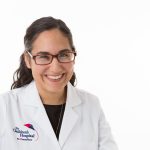“I had an interest in geriatric medicine, but didn’t know a lot about rheumatology,” Dr. Fessel says. With Dr. Peterson serving as her physician preceptor, Dr. Fessel worked in his office for two to three days each week for the duration of the rotation, learning about rheumatic disease. The experience piqued her interest in a specialty she hadn’t previously considered.
“It was wonderful to have a great preceptor like Dr. Peterson who was willing to teach me about rheumatology,” Dr. Fessel says. “He emphasized how important it was to check in with patients, to see if their condition has changed since the last visit and to help them maintain wellness.”
Now a nurse practitioner with Seattle Rheumatology Associates, Dr. Fessel says she enjoys working with rheumatology patients to help them achieve the best possible quality of life.
“Patients will come in who can hardly get out of bed because of their pain and stiffness,” Dr. Fessel says. “The medications we prescribe can be life changing. The addition of just one drug can help these patients get back to living.”
Some patients have specific treatment goals in mind, and Dr. Fessel says helping them reach their goals is extremely rewarding. “I remember one patient who sought treatment because he wanted to be able to hold a golf club again,” she says. “Golfing was his favorite pastime, and he was devastated when he had to stop due to pain and deformities. After treatment, he was able to resume golfing with a combination of medication and a modification to the grip on his golf club.”
Loan Forgiveness
In addition to taking action to increase the ranks of rheumatology professionals within the state, the WRA is active in advocacy, including efforts to offer pediatric rheumatologists loan forgiveness if they commit to serving in an underserved community in Washington for a specified period of time.
“There’s currently a bill in Congress to fund the Pediatric Subspecialty Loan Forgiveness Program [PSLRP],” Dr. Peterson says.
The PSLRP is a loan repayment program for pediatric providers in primary care, subspecialties and dentistry who serve rural and underserved areas. Reauthorization of this program was included in the CARES Act, but without any funding for it to operate. The WRA is joining the ACR in asking Congress to fund the program.
At the state level, says Dr. Peterson, “Washington’s 2021–23 budget instructs the Washington Health Corps to consider pediatric rheumatologists for state loan forgiveness programs.”



